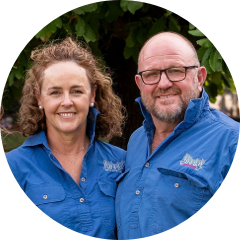Understanding electronic identification technology
This project was completed in 2023.
Project Officer
Sophie Hanna
WHY THIS PROJECT WAS NEEDED
Livestock producers are increasingly using electronic identification (eID) tags to support livestock management decisions. Despite the widespread increase in adoption, many farmers are not utilising the data they are collecting, or are not collecting data in the first place.
This project activity aimed to increase the utilisation of electronic identification (eID) tags and associated equipment and software by livestock producers to improve data recording and interrogation.
In short: Greater utilisation of eID tags, associated equipment and software and data collected will help farmers’ management decisions, leading to improvements in productivity, profitability and sustainability.
With improved record keeping and knowledge on animal performance, producers can better identify constraints and benefits to improve their productivity and efficiency, especially during periods of adverse conditions (climatic, economic or in response to disease), when decision making is critical and often made under pressure.
The project included a field day and webinar. Several publications were also produced, including a decision support tool and product guides. This project formed Activity 9 of the Agricultural Innovation Hubs Program.
Project outcomes
Riverine Plains held an eID and stock containment area field day near Howlong during June, 2023. The day enabled Riverine Plains farmers and advisors to see examples of stock containment areas and learn more about how eID equipment can add value to livestock enterprises.
A key topic was the importance of eID adoption for improving the traceability of Australian livestock for biosecurity purposes. While eID has been mandatory in Victoria for sheep and farmed goats since 2017, from January 2025, all sheep and goats born on-farm in NSW must also be eID tagged. From January 2027 all animals leaving a NSW farm must also be eID tagged.
The applications and opportunities for eID technology on-farm was addressed. Key messages included:
- You can’t manage what you don’t measure; eID enables efficient data management which helps make important management decisions
- Plan what you will use the data for before collection; define your breeding objectives and determine what data you need to collect to achieve these
- Depending on breeding objectives, farmers may use eID to record a combination of traits such as, weight gain, pregnancy or lactation status, fleece weight, birth type, etc.
- Recording individual data may empower important and timely decisions such as deciding which stock to sell, feed budgeting and identifying animal health conditions
- When handling data, whether in Excel or engaging with other software programs, keep it simple.
Stock containment areas can be used to improve farm business resilience in dry conditions. Key design considerations for maximising stock performance include pen size and stocking density, soil type, access to shade and shelter, as well as feeder and water-trough placement. The importance of monitoring and managing diseases, as well as feed budgeting to understand the quality and quantity of feed, was also discussed.
Attendees inspected a working containment area, while providers Gallagher, Te Pari and Datamars demonstrated a range of technology and equipment available to maximise the use of eID tags for stock management and handling.
This event was held as part of the Saving Our Soils During Drought project through the Southern NSW Drought Resilience Adoption and Innovation Hub, supported by Local Land Services, through funding from the Australian Government’s Future Drought Fund.
This event was also supported by the Australian Government’s Agricultural Innovation Hubs Program through the Victoria Drought Resilience Adoption and Innovation Hub.
Webinar training
Following on from the Livestock eID technology and stock management area demonstration, a webinar led by Nextgen Agri was held on 21 June 2023. The webinar delved into template creation, the collection of electronic ID data from indicators and handlers and using Excel to manage and interrogate data, which can then be used to make management decisions.
A decision support tool has been developed as part of this project to assist livestock producers with collating and interrogating data collected by EID tag readers.
Two publications were also produced to support farmers’ use of specialised eID technology and software. These include:
- Getting the most out of your Datamars Tru-Test Devices
- Getting the most out of your Gallagher Devices
Additional resources that farmers may find beneficial include:
- Datamars Trutest Setup Guide – Drafting using a 5000 weigh scale indicator
- Datamars Truetest XR5000 quick set up
- Gallagher Animal Performance Software (APS Standard User Manual)
An Excel spreadsheet was also developed to provide farmers with a data labelling template to help improve consistency in the way labels and headings are created. Having consistent heading or categories labels that are used year on year ensures the data can be analysed or interrogated across years; this is important when handlers are used for automatic drafting.
Find out more
For more information on this project, please email Riverine Plains Livestock Project Officer, Sophie Hanna at sophie@riverineplains.org.au
Project investment
This project was delivered via the Agricultural Innovation Hubs Program, supported by the Victoria Drought Resilience Adoption and Innovation Hub, through funding from the Australian Government’s Future Drought Fund.
MORE ON Drought & Livestock
Our research enhances food production, increases environmental resilience and improves community connection across the Riverine Plains. See how our research creates impact.
-
Livestock
Sustainability
-
Grains
Livestock
-
Grains
Livestock
-
Drought
-
Drought
-
Drought
Livestock
-
Sustainability
Drought
-
Drought
Livestock
-
Livestock
Fodder
-
Drought
Grains
-
Livestock
Drought
-
Drought
Livestock
-
Drought
People
-
Livestock
Grains
JOIN RIVERINE PLAINS
Riverine Plains provides opportunities to see new research and innovation, connect with rural communities, and attend informative events.


